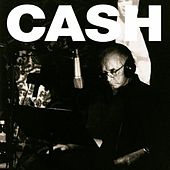Fitting finale to a great career

American V: A Hundred Highways - 2006
Johnny Cash releases have never been in short supply, and that certainly hasn’t changed since his death in 2003. In fact, there’s probably a college course in copyrights, public domain, and the terrain of small import labels to be found in the endless repackaging of his live shows and early tracks. The major labels haven’t been shy, either, releasing their fair share of thematic compilations, reissues, and box sets.
To be fair, though, some of those compilations, like last year’s The Legend box set, have addressed Cash’s musical legacy with authority. But even a fairly comprehensive set like that reaches a border that it can’t cross: Cash’s American recordings with Rick Rubin.
It’s likely that, even if Cash were remembered only for his spit n’ vinegar heyday, his death would have been greeted with endless tributes, but the reality is that Cash passed on after an unprecedented artistic resurgence that stretched across the last decade of his life, with Rubin stripping down Cash’s sound and opening a treasure chest of songs by some of rock’s best songwriters. Cash’s cred skyrocketed, especially with the indie and rock crowds, and the whole thing reached its peak with Cash’s devastating cover of Nine Inch Nails’ “Hurt”.
A Hundred Highways marks the fifth volume of Cash’s work with Rubin (not counting the Unearthed box set, which included four discs of previously unreleased sessions. And there’s no indication that it’s the last, although it reportedly contains the last song Cash ever wrote and recorded.
Recorded as Cash’s health continued to deteriorate, and after the death of his wife, June Carter Cash, A Hundred Highways feels different from the other American releases. The darkness that could often be found in Cash’s material has been banished in favor of meditations on God’s mercy (and yes, punishment), on love, on farewells, and on reunions. Some would argue that singing about death is fairly dark in and of itself, but those people have probably never heard it coming from someone who had as good of a run as Cash.
The album starts off with Larry Gatlin’s “Help Me”, which finds Cash on his knees, praying, “Lord help me walk another mile just one more mile”, setting the album’s tone of weary age. There’s still room for one flash of retribution, though, with “God’s Gonna Cut You Down”, which barrels in with a clanky Tom Waits feel and a lively vocal by Cash. He follows up with the last song he wrote and recorded, “Like the 309”, a spry ode to the train that will take his body home. A nice little trio about the afterlife—prayer, death, and delivery—to kick things off.
In fact, it’s hard to listen to A Hundred Highways without thinking of Cash in the beyond, meeting his loved ones “over yonder.” “Like the 309”, “Further On (Up the Road)”, “On the Evening Train”, “Four Strong Winds”, “I’m Free of the Chain Gang Now”: they all work as songs dealing with earthly matters, but each could just as easily be read as Cash anticipating his death, saying goodbye.
Contributing even further to the notion of Cash shuffling off into the sunset is the album’s sound. By and large, it’s spare, as if Cash were singing for himself (and it definitely feels like a companion to the recent Personal File collection of unreleased Cash material). His band’s accompaniment is subdued, playing off of whatever Cash and his health brought to the song that day, and there’s never a moment when he’s not front and center. His voice is at times fairly strong, at others very frail.
Listening to A Hundred Highways, and to earlier versions in the American series, it seems like these five discs encapsulate the effects of time not just on Cash, but on all of us. If age and sickness could wear down a voice of such power, a voice that sounded, in its prime, like it was a thousand years old, what what does it hold in store for the rest of us? And you can’t help but think that Cash’s decline mirrors the decline so many of us have seen around us in our own families, strong men and women cut low with astonishing speed.
It’s highly doubtful that any of this was in the minds of Cash or Rubin, this notion of making Cash’s last record a memento mori, a reminder that death comes for everyone. But it’s impossible to listen to this record without placing it in the context of its creation. The love songs evoke June Carter Cash, the mortality songs evoke Cash’s failing health. Even his fragile rendition of Gordon Lightfoot’s “If You Could Read My Mind” enters a different realm when Cash sings, “you know that ghost is me”.
If A Hundred Highways had kicked off Cash’s American resurgence, it might have been greeted as a minor release, a nice offering by an artist who was in his sunset years. However, the American series opened with power and glory and that voice coming down on you like fate’s own hammer. In that context, then, A Hundred Highways stands as a fitting, gentle coda, a farewell from a major talent. A farewell, no matter what other reissues and repackagings the future holds.